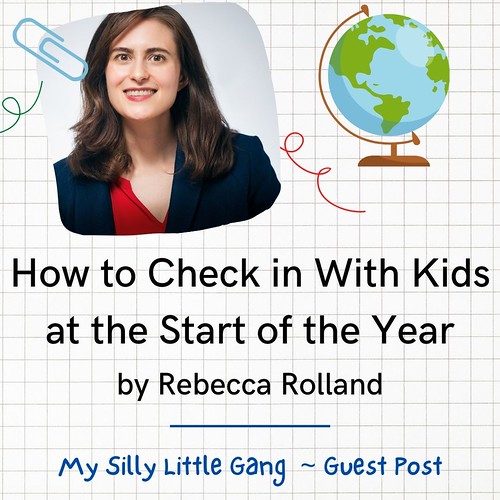With the start of the school year, it’s important to check in with your kids. However, we may not all know how to start these conversations. That’s why I am happy to share this guest post – How to Check in With Kids at the Start of the Year by Rebecca Rolland, EdD, Harvard Speech-Language Pathologist. I hope you find it useful.

Guest Post: How to Check in With Kids at the Start of the Year

How to Check in With Kids at the Start of the Year
by Rebecca Rolland, EdD, Harvard Speech-Language Pathologist
With the start of the school year upon us, it’s so important that we take the time to check in with kids about how they’re feeling. So many kids are experiencing trauma and grief. They may have lost a caregiver or parent, or maybe they know a relative or friend who has gotten sick or even passed away. And even if they haven’t experienced those challenges, they can still have a lot of difficulties getting back into the routine of in-person school after the summer. Especially when so many kids are feeling stressed or anxious, it’s key that we make the time to talk with them, and really explore how they’re feeling before the year begins.
Here are some tips to make those conversations work.
1. Start with questions like these:
If you’re not sure where to start, try these conversation starters:
- What are you most excited about for the new year?
- What are you most worried about?
- What do you think will be the same about this year versus last?
- What do you think will be different?
2. Explore and welcome all emotions.
Try to focus on accepting and welcoming all your child’s emotions. It’s okay to feel nervous, sad, or scared. Even if you want to protect them, the BEST way to protect them is to let them explore all those emotions in a way that feels supportive and engaged. You can think about emotions like the weather — they don’t have to stay forever, and they’re always changing.
This can be a good thing to talk about with your child. If they’re feeling down or stressed, help them realize that they probably won’t always feel that way.
3. Talk about strategies to help yourselves and each other.
If your kids are feeling down or worried, talk about what they might do in order to feel differently. If they’re worried about feeling lonely, maybe they could try meeting one new friend a day or talking to one new person on the bus. If they’re worried about the new teacher, maybe they could try talking with friends who’ve had that teacher before.
4. Stay open to dialogue.
Just letting your child know that you’re there for them is a really helpful thing. You’re inviting your child to talk to you when they’re ready — even if they don’t feel like talking now. That can open them up to having great conversations later on. It can also bring you closer, now, and for the months and years to come.

Rebecca Givens Rolland is an oral and written language specialist in the Neurology Department of Children’s Hospital Boston and a lecturer at Harvard University. As a nationally certified speech-language pathologist, she has worked clinically with populations ranging from early childhood through high school and provided teacher professional development. As faculty and Module Director at Harvard Medical School, she lectures on topics of communication, mental focus, and creativity. She frequently consults with organizations working to design powerful learning experiences for kids and adults, including the World Bank. She has an Ed.D. from the Harvard Graduate School of Education, an M.S. in Speech-Language Pathology from the MGH Institute of Health Professions, an M.A. in English from Boston University, and a B.A. in English from Yale. She lives in Boston, Massachusetts with her husband and two children. RebeccaRolland.com



Thank you for these tips!